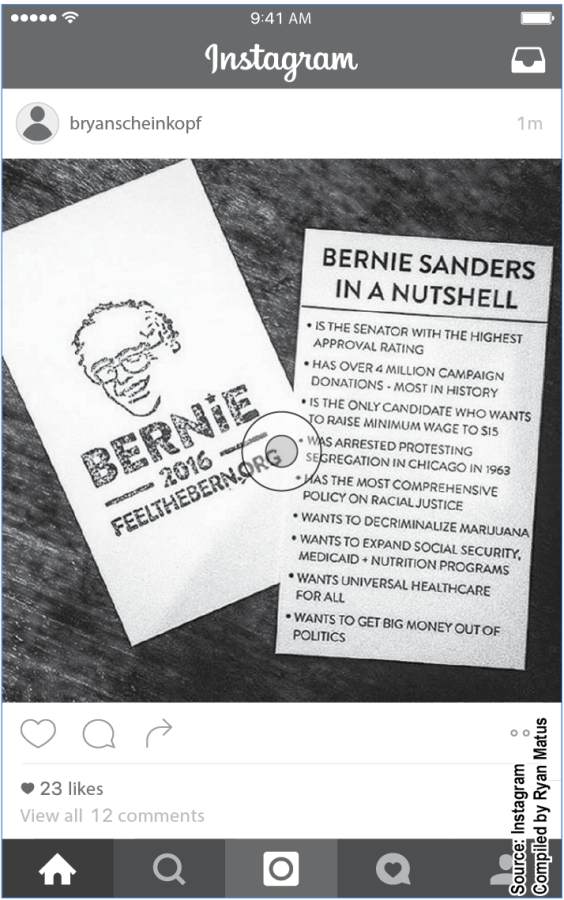Social media increases influence on politics
 When a Facebook friend messaged Glenbrook North graduate Bryan Scheinkopf a video of presidential candidate Bernie Sanders, his life changed.
When a Facebook friend messaged Glenbrook North graduate Bryan Scheinkopf a video of presidential candidate Bernie Sanders, his life changed.
“As soon as I heard about [Sanders’] platform, it was very obvious that this was a guy that aligned with my ideology a lot more,” Scheinkopf said.
Scheinkopf, like many others, has been influenced by the increased use of social media platforms such as Facebook and Twitter for political messages. This increase has been affecting not only political strategy but awareness as well, and continues to do so, according to Paul Brewer, professor of political science and international relations and of communication at the University of Delaware.
Scheinkopf said he had not really been involved in politics, yet knew he was going to vote in the upcoming election, as it would be his first opportunity to vote in a presidential election.
Now, Scheinkopf’s Facebook page contains dozens of political posts about Sanders, as well as other political messages. He said social media was one of the most significant factors in discovering Sanders.
According to Brewer, social media has been playing an increasingly important role in campaigns as well, citing presidential candidate Donald Trump’s as a prime example.
“Compared to traditional front-runners, Trump has spent relatively little on traditional forms of campaigning such as television ads,” said Brewer. “Nor has he needed to spend money on those forms of campaigning — all he has to do is write a provocative tweet, and it’s news.”
A study conducted by Brewer regarding how Facebook affects the political views of people found that when people with relatively little background on a political candidate see posts about him or her, these posts tend to influence the opinions those people have about the candidate.
Brewer said he concluded along with his co-authors that the increased use of social media outlets by potential voters opens up new possibilities for candidates to gain support and attention.
Although not on as great of a scale, Scheinkopf was able to see this play out in real life. He said he thinks he may have influenced the views and attentiveness of some people.
“At least on a few instances, people have told me that they have never been interested in politics before, and because of the commentary that I’ve been giving they sort of have been paying a little more attention,” Scheinkopf said.
Scheinkopf said he posts on Facebook to educate others on what is going on in the world so they can be engaged. He previously had been uninvolved and disinterested with politics.
Senior Chase Frankel also said he posts on social media to “broaden horizons.”
“I hope [people] think about [the post],” said Frankel. “I really sort of hope they read that and they go, ‘Well maybe he has a point.’”
Highland Park senior Sam Poll said Scheinkopf has acquired a reputation for being very vocal in his political beliefs, and even contacted him asking him a few questions.
“He provided me with an abundance of articles and quotes directly from Sanders’ site,” said Poll. “Next to this, his overflowing public posts in support of senator Sanders, while a little annoying in their abundant and relentless nature, do catch my attention.”
Scheinkopf said this reputation comes with a lot of responsibility.
“It also comes with perks because a lot of people message me and tell me, ‘Hey, thanks for doing what you’re doing, because I would not be informed otherwise,’” Scheinkopf said.

